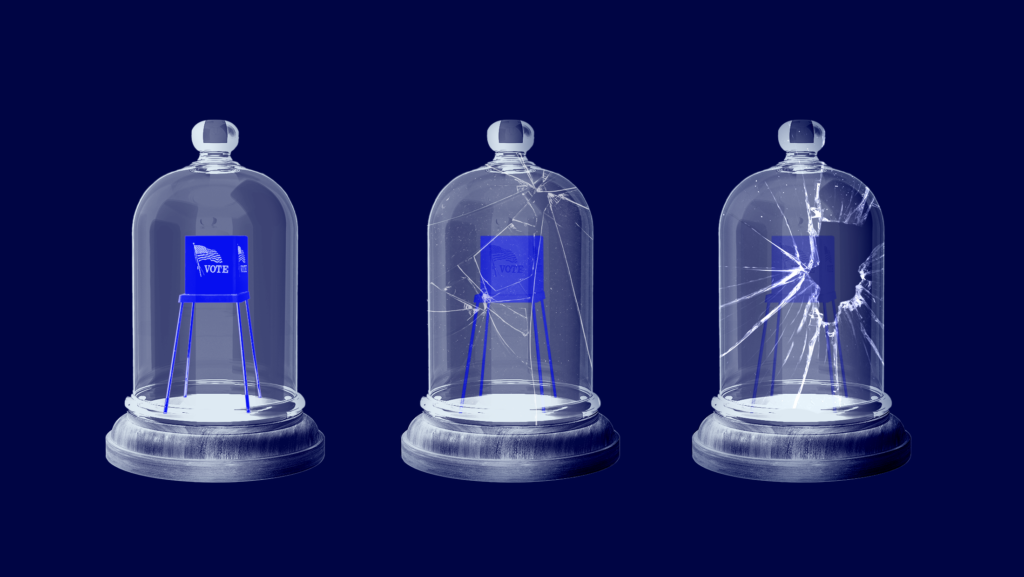We Can’t Ignore Republican Attempts to Undermine Free and Fair Elections

There are no perfect elections, only fair ones. In any election there will be some citizens prevented from voting and legal votes not counted. It is a tragedy that is built into a system that relies on machines and people to do the best they can. A free and fair election assumes that those errors are rare and unintentional.
But what if they are not?
Former President Donald Trump recently told Republican donors that “The vote counter is often more important than the candidate…We have to get a lot tougher and smarter at the polls.” He added that the RNC’s Chairwoman, Ronna McDaniel, had assured him that the party would “work on it.”
While many journalists discounted this statement as just the latest in a long line of outlandish claims by the former one-term president, to others it sounded like Josef Stalin’s comments, as reported by his personal secretary: “I regard it as completely unimportant who in the party will vote and how, but it is extremely important who will count the votes and how.”
At the beginning of Trump’s term, conservative journalist Salena Zito observed that with Trump, “the press takes him literally, but not seriously; his supporters take him seriously, but not literally.” After four years and a failed coup, we have learned to take him both literally and seriously.
Which leads me back to the question: what if Republicans intentionally engage in outright election subversion? As uncomfortable as it is to discuss, we need to establish before the election the framework for assessing whether an election meets the threshold of free and fair and, more importantly, what we will do if it does not.
To his credit, President Joe Biden has been soberly sounding this alarm, but journalists and pundits too often treat it with disdain rather than the seriousness it deserves. In his major speech on the subject last July, he warned about the risks posed by voter suppression and election subversion to free and fair elections, stating that “we’re going to face another test in 2022: a new wave of unprecedented voter suppression, and raw and sustained election subversion. We have to prepare now.”
Most recently in January, President Biden correctly resisted badgering by reporters to say that — under any circumstances — the results of the 2022 elections would be legitimate. In his refusal to do so, President Biden referenced a potential scenario where large numbers of lawful votes are intentionally discarded and not counted.
We saw this in 2018 when the North Carolina Board of Elections invalidated a congressional election after it was determined that the Republican campaign engaged in widespread election fraud, including ballot tampering that amounted to vote stealing. After a contested hearing that proved the full extent of the fraud, even the Republican candidate agreed that the election needed to be thrown out and that a new one should be held. The bipartisan state election board unanimously agreed.
While not every election dispute should result in a contested election, we cannot rule out the possibility that voting rights can be suppressed and the counting and certification process corrupted to such an extent that the resulting election will not meet the minimum standards to be called fair and free. Newly enacted laws aimed at suppressing the vote and subverting election results increase the risk that an election will lack legitimacy. When coupled with hyper-partisan election administration, the potential for abuse increases exponentially.
In 2020, Trump was caught on tape asking the Georgia secretary of state to “find” 11,780 votes that did not exist. Had he succeeded, the certified Georgia results would have been criminal and illegitimate. Yet, there is no guarantee that in 2022 or 2024 a Republican secretary of state won’t be willing to “find” or invalidate enough ballots to swing the outcome of an election — whether it is 11 ballots in a close House race or 110,000 in a race for Senate.
Here is what we should be doing now:
First, and most importantly, we need to acknowledge that we may have elections that fail to meet the minimum standard to be considered an acceptable and reliable expression of the will of the electorate. Second, we need to create a consensus among responsible actors as to what the criteria are for an election to fail the test of being considered free and fair. Third, we need to have an accountability structure in place for those who undermine or subvert elections. Finally, we must be prepared to call out election subversion – loudly, clearly and with moral authority – as an unacceptable attack on democracy.
I understand the reluctance to discuss the possibility that future elections will be corrupted. But refusing to discuss it won’t make the possibility less likely. The fact that Trump falsely claimed that the election in 2020 was not legitimate should not paralyze us from preparing for the possibility that a future election could fail that test.
As I have previously written, “[w]e are one, maybe two, elections away from a constitutional crisis” caused by Republican election subversion. I hope I am wrong, but we should prepare now in case I am correct.